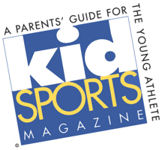By Steve Sampsell
"I told them once when I with the Los Angeles Rams that they were cramping my style … that didn't go over to well. But they went to all my games. They were always there for me. They're my heroes."
Bettis paused and, addressing the boy, continued.
"It's tough always having them around, but that's a good thing. It's OK for your mom to care. But mom, make sure you give him some space."
While Bettis appropriately pushed the spotlight off himself and toward families and parents as heroes and role models during his speech, it's not a matter that can be handled with words alone.
Now — with the Ben Roethlisberger saga still a top news story and almost two decades removed from perhaps the biggest cultural flashpoint regarding youth sports and the selection of heroes and role models by young athletes—the matter remains an ever-present part of athletic participation among youngsters and their families.
Seventeen years ago, then-NBA standout Charles Barkley wrote the text for his own Nike commercial, a black-and-white ad that lasted 27 seconds and provided water cooler talk for people who watched it air back then and remains a conversation starter for anyone exposed to it since.
Barkley, famed for his ferocious play, as well as his opinions, looked directly into the camera when he spoke just 42 words.
"I am not a role model. I'm not paid to be a role model. I am paid to wreak havoc on the basketball court. Parents should be role models. Just because I dunk a basketball doesn't mean I should raise your kids."
Many parents and psychologists or family and youth sports researchers agree with Barkley's premise.
At the same time, the families and parents of aspiring athletes have the most ability to best control what happens in that regard—and they invariably send a somewhat mixed message by encouraging (either overtly or with subtle actions) hero worship of professional athletes.
For example, fans in person or watching on TV can see all kinds of things during a Steelers game, but people clad in No. 43, No. 86 or any other jersey certainly represent one of the most common sights.
So, if that athlete's jersey is good enough for mom or dad to put on their backs, young athletes certainly get the message that the athlete's actions must be worth following on TV, in the paper or even mimicking on the field.
In the minds of youthful athletes, those pros certainly act and look like what society considers heroes, too. They earn million-dollar contracts, get perks such as fee cars and always help with the Make-A-Wish Foundation, the United Way or some charity endeavor.
Still, should pro athletes be the people whom young athletes perceive as heroes? Especially if the athletes themselves (as stated by Barkley and repeated by many others since then) do not want the job.
"We try to encourage our kids to appreciate and respect what accomplished athletes do, whether they're in the pros, college, or even high school. It takes a lot of effort and hard work to be good at something, and we want them to understand that," said Paul Williams, a father of three who helps coach a variety of youth sports (baseball, football, basketball, soccer). "It's OK to point out that people who are really good worked hard to get to that level, and it's great if they can transfer that work ethic it to other things.
"Most kids who play youth sports are not going on to be pros, or even to play sports in college. But they can still learn the value of hard work, working together and so many other lessons."
He knows that's easier said then done, though.
For Tara Anderson, who traveled to tournaments with her daughter's AAU basketball team every summer, the challenge to clarify the difference between heroes and role models—and who should be considered one or the other, or both—got easier as her daughter has grown older. She traveled with her child because she enjoyed the trips and also because she feared not being there if her daughter were injured.
"When kids are younger, they just see the attention and glory and they think that means someone's a hero," said Anderson. "We went through that phase, but we always stressed that people are people, no matter if they're famous or live next door.
Cultivating and practicing such a seemingly balanced outlook takes time, though, and Anderson, Williams and others believe helping their children focus on appropriate heroes or role models should not come at the expense of aspirations.
They believe lessons and messages about achievement and personal growth can be gleaned from pro athletes, college All-Americans or even the neighbor next door who earned playing time on the varsity football team after not playing much in junior high but working hard to get better.
"It's not easy, but you have to keep things in perspective," Williams said. "You want your children to respect people who achieve so much, but you also want them to treat everyone with respect. If you prepare them well, and give them a chance to succeed or fail on their own, they'll learn and be able to figure out who's a real hero and who's not."

